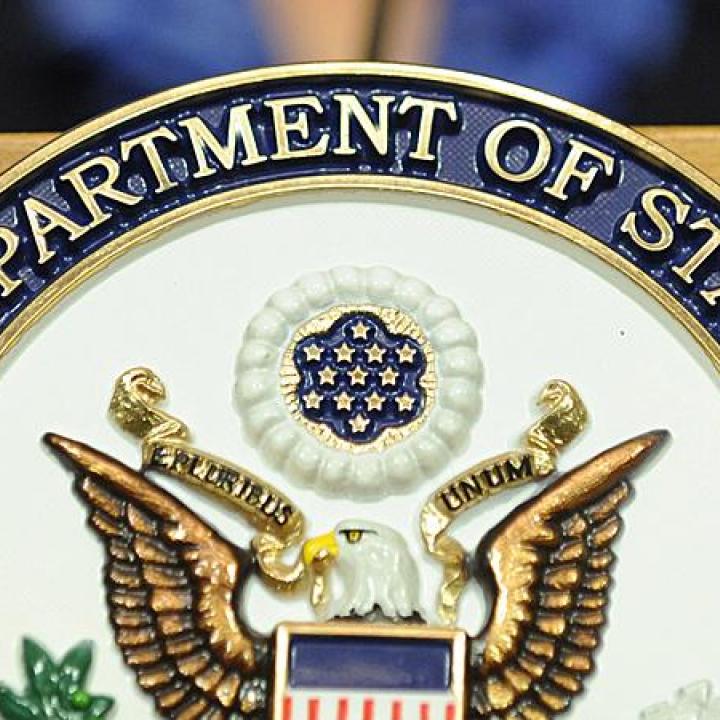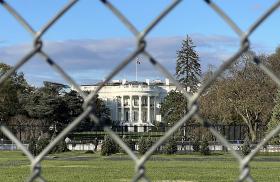
- Policy Analysis
- PolicyWatch 4090
Congressional Funding Increase Not Enough to Strengthen State Department

American assistance to the Middle East apparently won’t be cut back as drastically as the Trump administration hoped, but questions abound regarding the diluted department’s capacity to actually use the restored funds effectively.
Before leaving for the summer recess on July 23, the U.S. House Appropriations Committee passed a $44.7 billion budget bill for the State Department—$13 billion less than the previous year’s budget, but much higher than the Trump administration’s $27.5 billion request. Assuming the full House and Senate vote in a similar direction, it would mark a significant break from the White House—particularly given that the operations, management, and security portions of the bill are similar to the administration’s request, meaning that most of the restored billions are on the programs and policy side. Regardless of the raw budget numbers, however, extensive personnel cuts and the dissolution of the U.S. Agency for International Development (USAID) will make implementing the bill extremely challenging even if it passes.
Country-Specific Impact in the Middle East
Under the proposed State Department budget, U.S. assistance related to various countries in the region would remain mostly consistent with previous years, though several differences and nuances stand out:
Jordan. The administration requested just $200 million in State-administered Foreign Military Financing for Jordan (down from $425 million last year) and did not specify any economic assistance. Yet the new bill states that Amman will receive no less than $475 million in FMF and “$845.1 million in direct budget support”—an eye-opening statement given that no other country except Ukraine has received the latter type of transfer. The direct budget support would constitute 6 percent of Jordan’s total revenues if passed, reflecting consistent bipartisan congressional support for the kingdom whenever cuts are proposed.
The bill also mandates increased funding for private sector development and job creation in Jordan, as well as $5 million toward “evidence-based programs that assess the implementation of peace agreements and peace accords.” The U.S. International Development Finance Corporation has worked in Jordan since 2017 and could assume a greater role in expanding the private sector now that USAID is defunct.
Egypt. The bill calls for no less than $1.45 billion in FMF, including the $75 million withheld by the Biden administration for human rights violations. This assistance does not include any preconditions related to Cairo’s policies toward Gaza. Another $40 million is allocated toward scholarships for Egyptians. Yet implementing such programs will be challenging now that the State Department’s Bureau of Educational and Cultural Affairs and grantmaking experience have been gutted, while embassies lack the capacity to handle such initiatives without USAID.
Israel. No significant changes have been made to Israel’s $3.3 billion in FMF; rather, committee members expressed strong support for the country’s military accomplishments and cited anti-Israel bias to justify cuts to UN organizations. Once the proposal advances to the full House and Senate, however, opponents of the Gaza war will no doubt aim to cut funding for Israel’s weapons systems.
Palestinians. Both the House committee and the administration have proposed restrictions that indicate they are not ready to support Palestinian reform efforts or Gaza reconstruction. If the U.S.-funded Gaza Humanitarian Foundation gains traction, it may receive funding at a later stage of the appropriations process through other funding mechanisms.
Iran. The committee made an extensive policy statement about the continued availability of funds to counter Tehran’s proliferation and terrorist activities. Yet it also emphasized the need to restore $55 million to the Near East Regional Democracy fund, which supports internet freedom in Iran and similar activities.
Bahrain. The bill provides $4 million to Bahrain to increase membership in the Comprehensive Security Integration and Prosperity Agreement, following the United Kingdom’s decision to formally join the framework. Although the new funding is minimal compared to the billions in private sector money envisioned under C-SIPA, it signals congressional support for expanding the agreement.
Lebanon. The committee’s approach to the Lebanese Armed Forces remains ambiguous. Despite a longstanding record of skepticism toward and restrictions on the LAF, Congress has consistently granted the force $100-150 million annually. Yet neither the administration’s request nor the House bill mentions funding the LAF in the next fiscal year, even though the force is now playing a more active role in maintaining the Hezbollah ceasefire with Israel.
Syria. The future of U.S. funding for post-Assad Syria was not addressed in the new bill, apart from a statement endorsing the administration’s removal of sanctions.
Iraq. No funds were appropriated to Iraq aside from those supporting military operations against the Islamic State, despite Washington’s expectation that Baghdad do more to curtail the various pro-Iranian, U.S.-designated terrorist militias in the Popular Mobilization Forces (as Secretary of State Marco Rubio emphasized in a July 22 call with Prime Minister Mohammed Shia al-Sudani).
General Provisions
The bill restores billions of dollars to international organizations, peacekeeping operations, and the Bureau of International Narcotics and Law Enforcement Affairs (INL), which the administration nearly zeroed out. But there’s a catch—it still permits the administration to reassign as much as $1.7 billion to the discretionary “America First Opportunity Fund,” thereby inhibiting any State Department planning for the originally intended use of the funds.
Most surprisingly, the committee restored $315 million to the National Endowment for Democracy and $345 million to the Democracy Fund, both of which conduct substantial work in the Middle East. Although the Trump administration’s “America First” agenda directly opposes democracy advocacy, the committee noted its strong belief “that defending democracy and human rights is fundamental to United States national security.”
Funding Increases Can’t Replace Capacity or Know-How
The fundamental problem with the bill is that some of the employees, posts, and bureaus needed to effectively use the restored funds are no longer around. While one could certainly argue that the State Department’s overall size has ballooned unnecessarily over the years, more than 3,000 employees were either suddenly laid off or took early retirement in recent months, and additional reductions are likely as administration officials begin their review of embassies and consulates. Inevitably, many of these cuts have resulted in the loss of crucial know-how and administrative capacity.
For example, the department’s democracy and education bureaus were virtually eliminated during President Trump’s first few months in office, including the grant specialists needed to sustain the programs that the House committee is attempting to restore. Hence, if the administration decides it wants to participate in a major regional initiative like rebuilding Gaza, it no longer has the expertise to design and execute such a process, since the State Department stabilization office and USAID have both been axed.
Appropriating funds to restore programs is one way to influence the State Department. But if officials have already eliminated the requisite program staff, then the extra money may wind up serving little purpose. Accordingly, Congress should hold consultations or hearings about whether the department has the number and quality of personnel needed to execute the proposed budget.
Ben Fishman is the Steven D. Levy Senior Fellow in The Washington Institute’s Rubin Program on Arab Politics.



